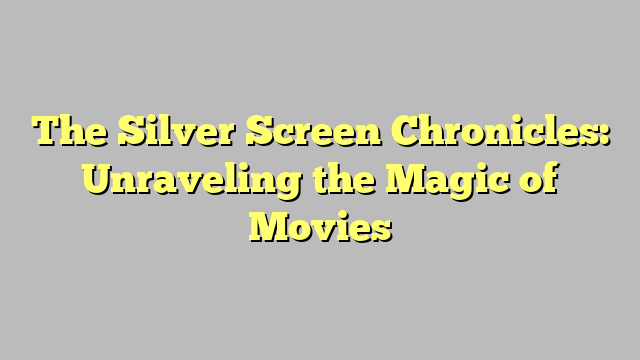Lights, camera, action! Movies have captivated audiences for over a century, transporting us to different worlds, enticing us with thrilling narratives, and evoking a myriad of emotions. From black and white silent films to today’s visually stunning spectacles, the world of cinema has truly become a magical realm that continues to influence our lives in ways we can’t even fathom. Through the lens of a camera, stories come alive, characters become our friends, and the world transforms into a canvas where dreams are realized. Movies have an extraordinary power to entertain, inspire, and challenge our perspectives, making them an integral part of our cultural fabric. So, let’s embark on this enchanting journey into the heart of the silver screen and unravel the magic that movies bring to our lives.
History of Movies
In the early 1890s, the concept of moving pictures began to captivate the imaginations of inventors and pioneers in the field of visual storytelling. Lumière brothers, Auguste and Louis Lumière, played a crucial role in the birth of cinema by inventing the cinematograph, a portable device that could both capture and project moving images. With their cinematograph, they held the first public screening in December 1895, showcasing their short films to an amazed audience. This marked the beginning of a new era in entertainment.
Soon after, filmmakers around the world started experimenting with this groundbreaking technology. From silent films to talkies, black and white to technicolor, movies quickly evolved and began to mesmerize viewers with their storytelling prowess. Hollywood emerged as the epicenter of the film industry, producing iconic movies that have stood the test of time.
The advent of sound in cinema revolutionized the medium once again. "The Jazz Singer," released in 1927, became the first feature-length motion picture with synchronized dialogue and music, ushering in the era of sound films. Audiences were captivated by the ability to not only see but also hear the characters on the silver screen, adding a new layer of immersion.
As technology continued to advance, so did the art of filmmaking. With the introduction of computer-generated imagery (CGI), filmmakers gained the ability to create mind-bending visual effects and bring fantastical worlds to life. This opened up a whole new realm of storytelling possibilities and paved the way for epic blockbusters that enthralled audiences worldwide.
Movies have become an integral part of our culture, serving as a means of entertainment, inspiration, and reflection. They transport us to different times, places, and emotions, evoking laughter, tears, and everything in between. From classic masterpieces to contemporary gems, the history of movies is a testament to the magic of storytelling through visual medium.
The Impact of Movies on Society
Movies have a profound impact on society, influencing our thoughts, emotions, and even our behavior. They have the power to transport us to different worlds, evoke strong emotions, and shape our beliefs and attitudes. Here, we will delve into the ways movies leave an indelible mark on our society.
Firstly, movies serve as a medium for storytelling, allowing us to explore various aspects of the human experience. They enable us to walk in the shoes of different characters, understand their perspectives, and empathize with their struggles. By portraying diverse narratives, movies broaden our horizons and foster a sense of compassion and understanding within society.
Secondly, movies have the ability to bring attention to important social issues. They shed light on topics that might otherwise go unnoticed or be frequently ignored. Whether it’s addressing political conflicts, social injustices, environmental concerns, or mental health challenges, movies have a unique way of raising awareness and sparking conversations that can lead to positive change.
Lastly, movies have an immense influence on popular culture. They shape our fashion trends, introduce new phrases into our vocabulary, and establish iconic characters that become ingrained in our collective memory. From captivating catchphrases to memorable soundtracks, movies have the power to leave a lasting imprint on society’s cultural landscape.
In conclusion, movies go beyond mere entertainment; they have the ability to shape society’s values, perceptions, and actions. They bridge the gaps between different cultures, ignite important conversations, and leave an impactful legacy. As we unravel the magic of movies, it becomes evident that they hold an extraordinary power that continues to shape our world.
The Future of Movies
In recent years, the world of movies has experienced significant advancements and transformations. With the rapid development of technology and the ever-evolving tastes of audiences, the future of movies holds both exciting possibilities and potential challenges.
First and foremost, the advancement in technology is reshaping the cinematic landscape. The rise of virtual reality (VR) and augmented reality (AR) present new opportunities for immersive storytelling. Imagine being able to step inside your favorite movie world, interacting with characters and exploring their surroundings firsthand. This level of engagement could revolutionize the way we experience films and bring a whole new dimension to storytelling.
Furthermore, streaming platforms have been steadily gaining popularity, altering the traditional movie distribution model. With the convenience and accessibility they offer, streaming services are reshaping the way movies are consumed. As these platforms continue to expand, we can expect a shift towards more personalized and on-demand movie experiences.
However, amidst these advancements, it is important to acknowledge the potential challenges that lie ahead. The vast amount of content available on various platforms can make it difficult for movies to stand out. As competition increases, filmmakers will need to find innovative ways to capture audiences’ attention and create unique cinematic experiences.
In conclusion, the future of movies is an exciting and dynamic frontier. Technological advancements, coupled with changing viewing habits, offer both opportunities and challenges for the film industry. With the right balance of creativity, innovation, and audience engagement, the magic of movies is sure to continue captivating audiences for generations to come.
